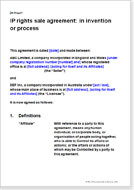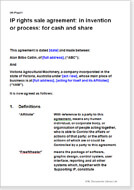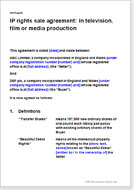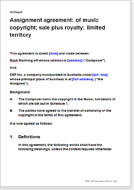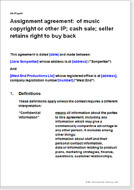Intellectual property assignment agreements
These assignment agreements are for the transfer of rights in software, copyright or other intellectual property. Use them where you want an outright sale rather than a licence.
IP rights sale agreement: in invention or process
This is an agreement for the sale of rights in an invention or improvement, or in any software or technical product. It may be an innovative new product for sale or a device to improve an existing product. The product could be a software game or designs for a railway bridge or any other invention. We assume the buyer requires full control so that he can brand and market it as his own. Option for seller to licence supporting intellectual property.
IP rights sale agreement: in invention or process: for cash and shares
This is an agreement for the sale of rights in an invention or improvement, or in any software or technical product. It may be an innovative new product for sale or a device to improve an existing product. The product could be a software game or designs for a railway bridge or any other invention. We assume the buyer requires full control so that he can brand and market it as his own. Option for seller to licence supporting intellectual property, like trade marks or patents. Payment in cash and shares. Other options too.
IP rights sale agreement: in television, film or media production
This is an agreement for a buyer and seller of rights in any audio-visual creative work. Neither party is preferred. The work could be a film, a television production, an advertising production. We assume the buyer requires full control so that he can brand and market it as his own, so the deal is a sale and not a licence. Payment is part cash and part shares in the buyer company. Edit for a straight cash deal.
Assignment agreement: of music copyright; sale plus royalty; limited territory
This is a straight forward cash sale plus continuing royalty agreement of rights in music for recording and resale and/or performance. The agreement specifies the terms and limitations you can select.
Assignment agreement: of music copyright or other IP; cash sale; seller retains right to buy back
This is a straight forward assignment of music or other IP rights for cash with a right of first refusal for seller (pre-emption right). Option for seller to retain some rights. Thorough but flexible agreement.

If the document isn’t right for your circumstances for any reason, just tell us and we’ll refund you in full immediately.

We avoid legal terminology unless necessary. Plain English makes our documents easy to understand, easy to edit and more likely to be accepted.

You don’t need legal knowledge to use our documents. We explain what to edit and how in the guidance notes included at the end of the document.

Email us with questions about editing your document. Use our Lawyer Assist service if you’d like our legal team to check your document will do as you intend.

Our documents comply with the latest relevant law. Our lawyers regularly review how new law affects each document in our library.
Sell or transfer rights in any type of intellectual property
The documents on this page transfer your rights in intellectual property that you have created or otherwise own, to someone else. In legal jargon, these documents assign your rights. In everyday language, they deal with a sale.
The legal framework for a sale of rights is largely the same regardless of the type of IP being sold. A sale in a composition of music is not dissimilar from the transaction for the sale of a complex technological innovation.
These documents can be used to sell: a set of photos, a book, know how, a film script, architectural drawings, chemical formulae, film rights, trade marks, web page articles, a patent, or anything else.
The law does not restrict what sale terms you can agree. For that reason, we have been able to give you a very wide range of alternative deals and arrangements.
For example, payment might be cash up front, by royalty, by shares in the acquiring company or any combination.
It follows that when you look for the right document for your sale, look at the terms of the deal as well as the subject matter we have named in the title. If you need help, please ask us.
Who should use these documents?
Either the buyer or the seller could use these documents. They are written to be fair to both sides because even though the transfer is immediate, the buyer may still rely on the seller for co-operation with ongoing support.
Our guidance notes explain each paragraph so that editing a document is easy whether or not you regularly sell IP.
Strong legal documents
Where we refer to a document as 'simple' we mean it is uncluttered by supplementary arrangements – not that the legal effect is in any way compromised.
In contrast, a document described as 'heavyweight' contains many more options. You may or may not use all the options we give but by providing them, we hope to give you more ideas for consideration. You can easily delete the ones that are not applicable to your deal.
Limiting the rights sold
All these documents give you the flexibility to sell the legal title in IP rights subject to conditions on use by the buyer.
For example, you could sell rights to a design for a component, but limit the buyer to use that component only in certain products.
Selling limited rights allows you to maximize the value the IP because you can sell the rights multiple times to different buyers for different uses.
The other reason you might want to limit the rights sold in certain cases is because your IP contains the intellectual property under licence from someone else, and that you don’t have a licence to sell it.
What our documents cover
So far as applicable, our documents cover:
Fictitious names for people and products
We give fictitious names to the parties in the contract and the IP so that it is easier for you to follow the document. Of course, you will need to change these to the names of your own parties or products, or use generic ones.
Complete legal and commercial framework
Every agreement comprehensively provides the terms you need for a deal. We cannot mention every detail of every document here, but you can be confident that if you are likely to need a term, we include it.
Support by the owner or creator to the licensee
Many deals involve not only a sale, but also a licence of secondary IP that supports the primary IP sold. For example, you might sell a physical product that requires software to operate. Updates to the software would be licensed rather than sold with the hardware.
The reasons why you might want to licence some IP rights rather than sell all are the same as why you might want to limit the rights sold: you may want to retain control to maximize the value you receive; or you may not have the rights yourself to sell.
We provide in many of our documents for an additional licence to complement the sale. If not needed, these terms can easily be deleted.
Preserving moral rights
Although a creator automatically by law has the right to be recognized, we do nonetheless mention it in many agreements.
All rights reserved

